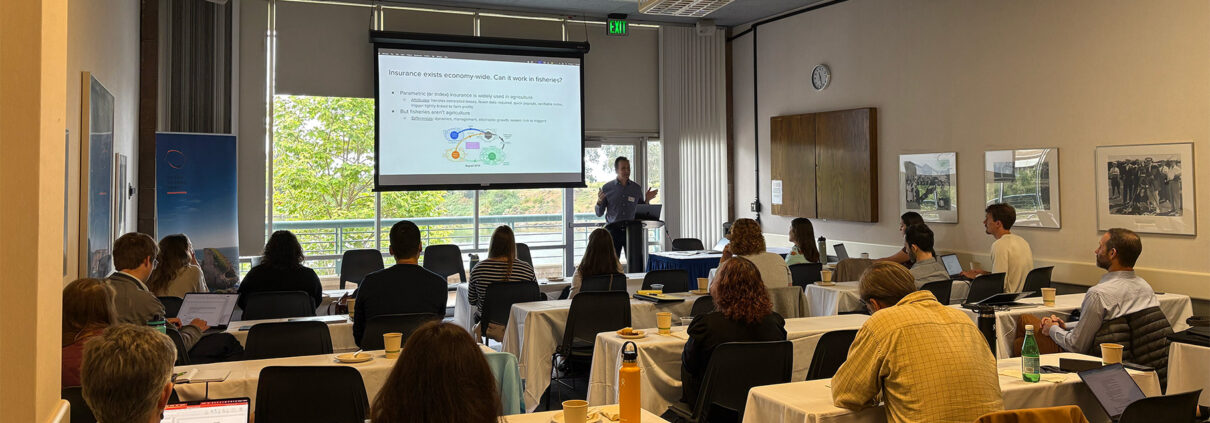It’s o-fish-ial! Ocean Science Trust hosted a workshop May 2nd, 2025 exploring insurance for West Coast wild capture fisheries and fishing community resiliency under a changing climate.
As extreme environmental events increase with frequency, intensity, and duration due to climate change, fishery disasters have increased in the U.S., resulting in varying economic impacts to fishing communities. There is a need to investigate the role of other risk management and transfer tools, such as insurance, to help communities weather a crisis. This workshop brought together experts and perspectives from academia, fishing community members, relevant decision makers, and insurance industry representatives to develop a shared understanding of how fisheries insurance may support fishermen and local fishing economies into the future. Through a series of presentations, the group discussed recent findings, pilot projects, and thinking around fisheries insurance. In the afternoon, workshop participants rolled up their sleeves to brainstorm potential designs and themes emerging for fishery insurance products, and identified science and information gaps needed to advance these tools. It was fin-tastic!
A few major takeaways from our discussions that emerged included:
- • Workshop participants agreed that insurance, and insurance-like products (e.g., mutual insurance), could potentially bridge the economic gap for fishing communities between disaster events.
- • A group or community-based insurance scheme (parametric or business interruption) with a management trigger is a potential insurance scheme for fisheries on the West Coast. Workshop participants brainstormed having a pool where a fisherman’s association group serves as the policyholder and the payouts are triggered by a fishery closure. There are still questions around whether a fishery closure mandated by management decisions codified in state law is independent and non-manipulatable, and thereby a potentially viable trigger from the perspective of insurance companies.
- • Parametric insurance, where payouts are based on a predefined index or “trigger”, is another option worth exploring. Workshop participants believed parametric is worth exploring, but would require further research to develop triggers. There are questions around how to deal with natural variability in environmental data and time lags between an event and impact on a fishery, quantifying the relationship between a trigger and fishery outcome or harvest, and developing a composite trigger using multiple environmental metrics potentially using artificial intelligence to increase accuracy of that trigger.
- • Beginning building a pilot insurance product for West Coast fisheries is a viable next step. While this workshop served to begin the discussions around insurance, participants agreed there is a need to have a dedicated space for conversation between the insurance industry and fishermen to flesh out the details and actually build an insurance product collaboratively – potentially via a collaborative working group charged with the development of a pilot financial risk management product for California fisheries.
- • Insurance is one layer in the resiliency cake. Other resiliency strategies (e.g. nature-based solutions for risk reduction, management improvements) and financial tools (e.g. catastrophe bonds, disaster aid) should continue to be explored.
Following this workshop, OST will develop a roadmap for fisheries insurance discussing recent findings in the field, emerging themes for fisheries insurance for the West Coast, and major science needs and knowledge gaps.




